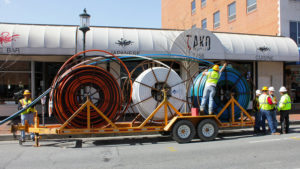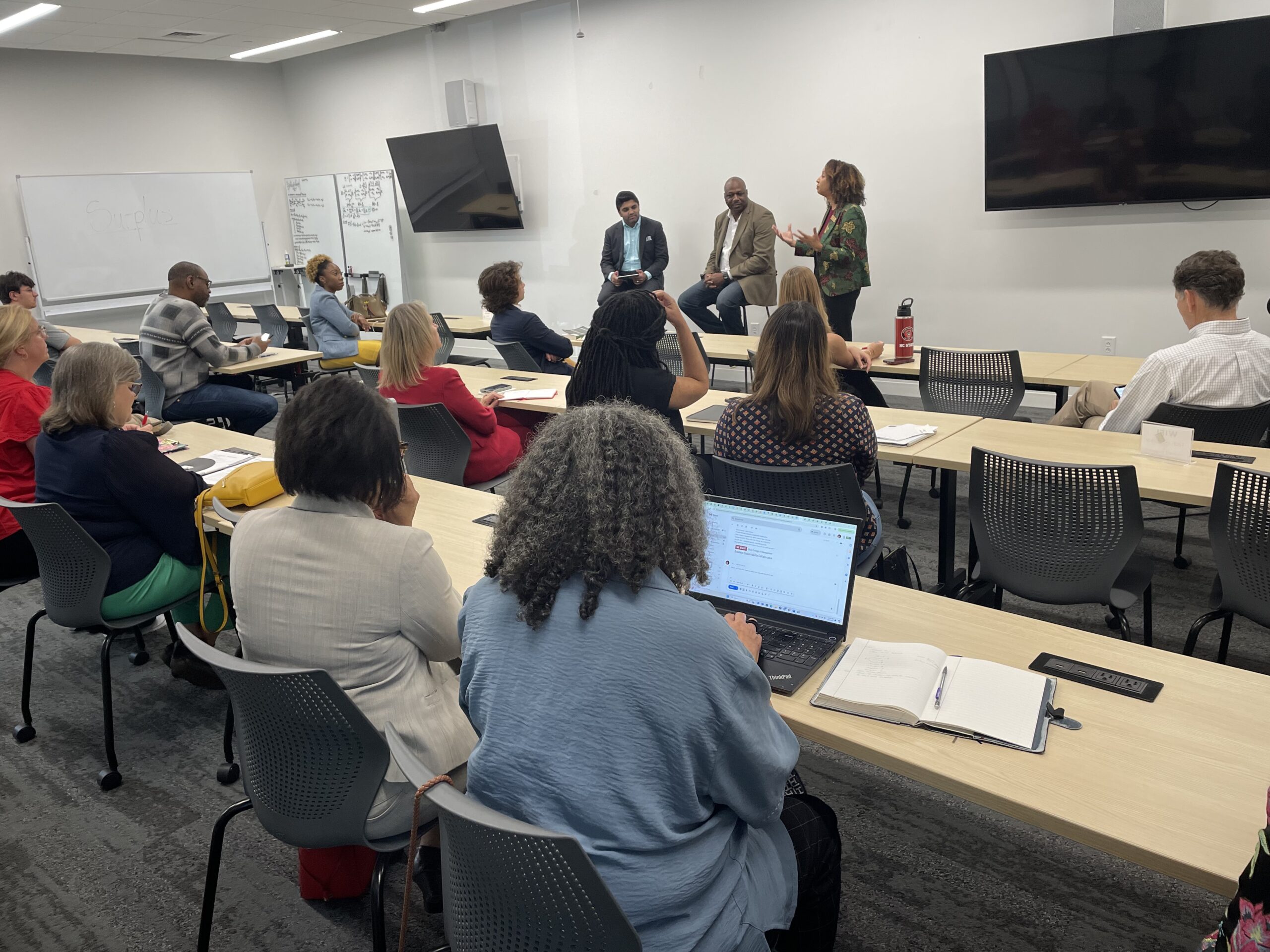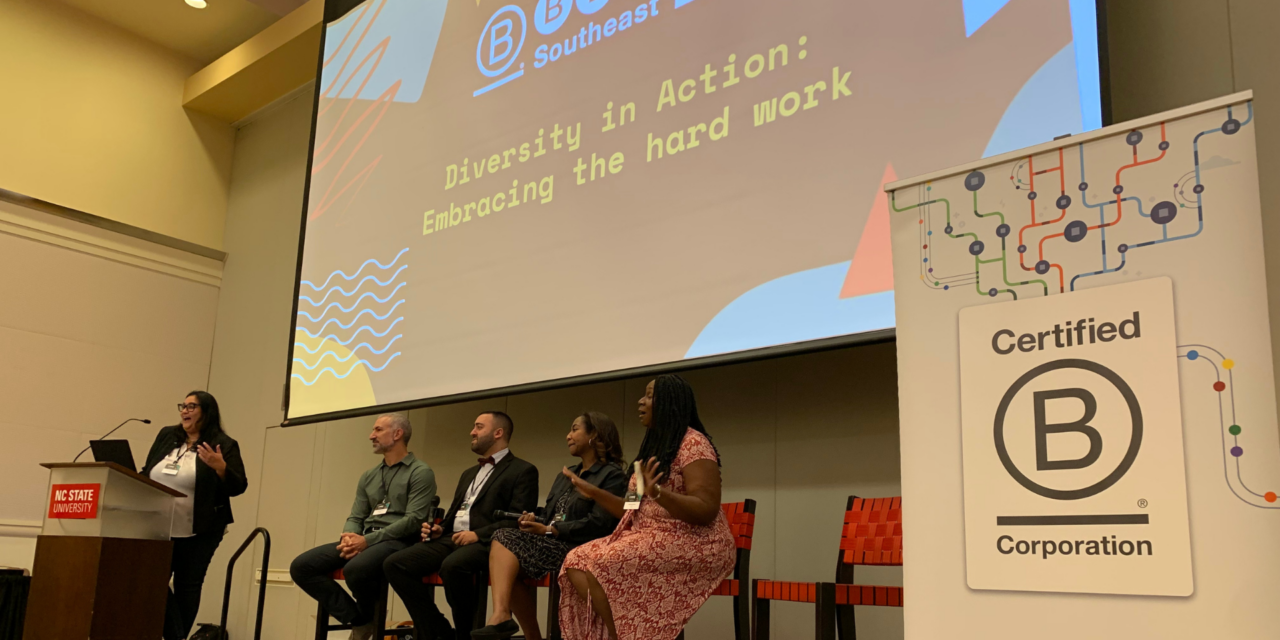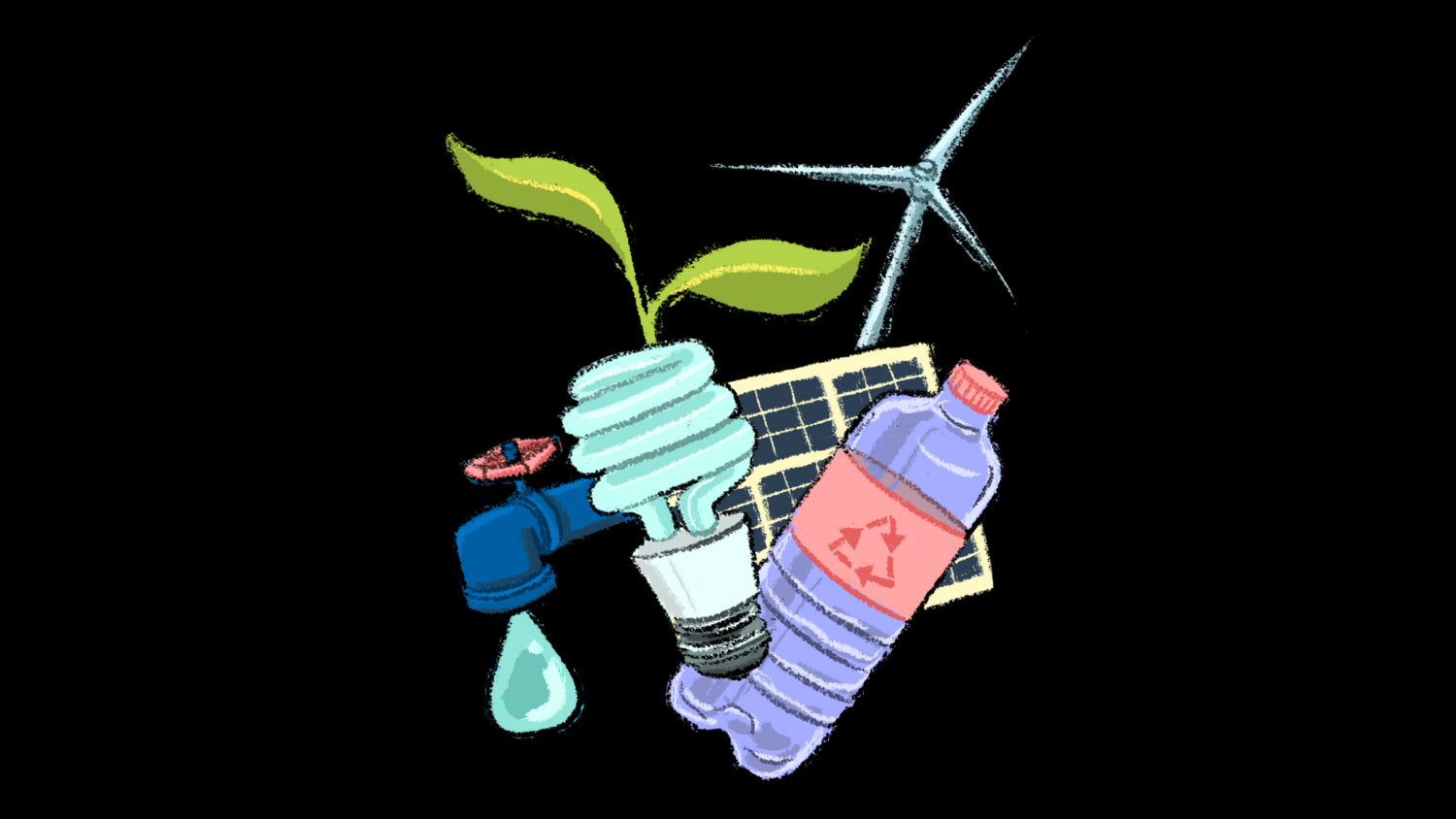How will fiber broadband impact sustainability?

Fiber Optic Spools. Photo credit: woodleywonderworks
North Carolina is well on its way to having some of the fastest and cheapest broadband in the whole country. With private companies, municipal utilities and rural electric cooperatives all investing in fiber, people across the state will soon enjoy significantly faster speeds at a much lower cost.
These new networks have the potential to move our state towards a more sustainable future. They can change how work gets done, and reduce the need to travel or own a car. Abundant bandwidth creates new opportunities to develop sensors to track and communicate environmental indicators, like how warm it is in your bedroom or how much nitrate is in the water coming out of your faucet.
However, spending more time online does take its own toll on the environment. The data centers that companies like Apple and Google operate use a lot of energy to stay cool, and the mining operations that allow for cheap consumer electronics are a major threat to biodiversity and human rights. As kids spend more of their youth staring at screens, instances of nature-deficit disorder could sky rocket and the next generation of North Carolinians may not develop enough love for their local landscape to protect it from profit-seeking interests.
Faster, cheaper broadband could be a major asset as North Carolina tries to move towards sustainability. Ultimately, the impact these new fiber networks will have largely depends on how the people of North Carolina decide to use them.
Fiber Build-outs Across the State
Google recently announced plans to offer fiber service to Raleigh-Durham and Charlotte. AT&T also has plans to offer a fiber service in Wake Forest, Raleigh-Durham and Charlotte. Frontier Communications already offers gigabit service in parts of the Research Triangle. Industry experts predict that new fiber networks will force cable to upgrade their system and lower their prices in order to create a comparable service. Both fiber and cable providers will install numerous wifi hotspots, increasing wireless broadband speeds and potentially lowering prices through WiFi-first mobile services, like Raleigh based Republic Wireless .
In rural areas, electric membership cooperatives (EMCs) are laying the groundwork for better broadband services. Blue Ridge, French Broad, Lumbee River and Roanoke EMC are all investing in fiber assets, which they can lease to larger ISPs, or use to offer their own high speed broadband service.
Currently, the city of Wilson has the fastest and cheapest broadband service in the state, thanks to community-owned Greenlight. Wilson’s municipal utility company built the network before the state legislator banned municipalities from offering broadband services. Last Thursday, the FCC voted to overturn state laws preventing municipal networks, making it legal for municipalities to create their own networks, and allowing Greenlight to expand into new areas. The FCC ruling could still be overturned by the courts or the legislator, but even if the state continues prevent municipal networks from offering broadband services, there are enough private companies investing in next generation networks across the state to guarantee that North Carolina will soon have some of the cheapest and fastest broadband in the US.
The Ecological Benefits of Broadband
Fast, reliable internet connections impact every sector of society. Broadband connections have already transformed how we work, how we get around, how we shop and entertain ourselves and even how we socialize with friends. These changes will likely continue and intensify as fiber build-outs improve connection speeds and lower the cost to connect across the state.
Better broadband could be a major asset as we try and develop more sustainable ways of meeting our needs. In a 2007 economic analysis of the environmental benefits of broadband services, The American Consumer estimated that widespread adoption and use of broadband-based applications could lead to an “incremental reduction of more than 1 billion tons of greenhouse gas emissions over ten years.”
Collectively, we burn a huge amount of fossil fuel just getting people to and from work. Telecommuting is one of the easiest ways to reduce the ecological cost of doing business. As home broadband speeds improve, many employees will be able to regularly skip the commute and be equally productive at home or a nearby coffee shop or co-working space. This allows companies to downsize their offices, reducing energy use and emissions associated with construction.
The benefits of telecommuting extend far beyond ecological impact. Employees save money on gas and time spent in traffic. In a 2009 Cisco survey, telecommuters reported experiencing higher rates of productivity, better work-life flexibility and overall improved satisfaction with work. When Cisco started using telecommuting internally in 2007, it kept 47,320 tons of greenhouse gasses out of the atmosphere and saved its employees $10.3 million in fuel cost.
At current broadband speeds, a virtual meeting is hardly a replacement for a face-to-face interaction. Video conferencing is a step up from conference calls, but over a DSL or cable connection, video calls often lag and randomly disconnect. A gigabit connection will make video chatting feel more like sitting across the table from someone, and could even allow conversation partners to appear as holograms.
Each year, we do a little more of our shopping online. Instead of having to travel from store to store looking for the best deal, people do their research and purchasing from the comfort of their own home. A number of companies are developing ways to try on clothes using 3D digital avatars. Items purchased online do need to be delivered, but the additional emissions that a delivery service uses to deliver one more package is negligible compared with the emissions needed to get a shopper to and from a store. Amazon is also researching drone delivery, which could further cut emissions associated with shopping.
Digitization reduces the ecological costs of producing material items like books, movies and CDs. Printing a book requires paper and glue, which need to be transported to a publishing facility and then shipped to a store. The marginal cost of producing another copy of an E-book is zero.
Some internet services allow users to avoid consumption all together. Services like streetbank allow people to list anything they have that they are willing to share with their neighbors, creating a list of neighborhood assets that community members can make use of. Craigslist’s rideshare service connects people traveling in the same direction, allowing them to split gas costs and reduce the number of cars on the road.
How Fiber Could Help
Many people use existing internet connections to take advantage of these emission-saving practices. The fiber build-outs will reduce the price that people pay to connect, which should increase the number of people using more sustainable broadband services. Exactly what people will do with the increased bandwidth that fiber networks enable is unclear. So few people in the US currently have a gigabit connection that the most important applications that utilize these faster speeds have not yet been invented.
Blair Levin, author of the National Broadband Plan, is the executive director of Gig.U, a consortium of research university communities interested in accelerating fiber deployments. North Carolina Next Generation Network emerged out of this effort, which helped convince AT&T and Google to start laying fiber. Levin, who used to practice law in North Carolina, is thrilled to see it become ‘ground zero’ in fiber competition.
“The purpose of Gig.U is to deliver abundant bandwidth to the communities most capable of experimenting and developing new, gigabit-dependent services. University towns are filled with innovative individuals who will figure out how to make good use of abundant bandwidth.” When asked about what a gigabit connection means for sustainability, he lists a number of applications already under development. Telemedicine could allow doctors to preform diagnostics and surges remotely. Self-driving cars could eliminate the need for individuals to own their own vehicle. Fiber build-outs result in much better wifi coverage, which researchers or environmental protection officials could use to monitor air and water pollution.
“Bandwidth is a necessary but not sufficient input in helping address environmental problems. It’s going to take Tarheel ingenuity on top of that bandwidth to really make a difference.” Though he believes that cheaper, faster broadband will absolutely enable all kinds of ecologically beneficial innovations, Levin emphasized that none of this is a replacement for the political will to seriously address environmental issues. “You can stick sensors all along North Carolina’s rivers so you know exactly what different industries are dumping into the watershed, but if the people in elected office do not care about this information, it won’t do much good.”
Online Time’s Toll on the Environment
Spending more time online is not without its share of ecological impacts. Streaming a movie or listening to internet radio may not seem to impact the environment, but the large data centers that enable these services to run can consume as much energy as a small city.
All of the machines inside of a data center generate heat, and the energy to keep them cool has to come from somewhere. Google’s fiber build-out will force the company to continue to expand its data center in Lenoir. Google has done a lot of research developing more efficient data centers, and has shared this research with other companies. Still, keeping the data centers running requires significant energy inputs.
Fortunately, Apple and Google have made clear that they do not want the energy they use for their North Carolina data centers to come from coal. This has prompted Duke Energy to invest heavily in solar projects nearby. In Sweden, a company called EcoDataCenter has developed a carbon-negative data center, but there are no plans to bring such a data center to the US any time soon.
The ecological cost of keeping the internet running pales in comparison with the environmental impact of cheap consumer electronics. The aluminum in laptops generally comes from mines in the rainforest, where thousands of acres were flooded to create enough hydro-electric power to smelt the ore into a usable material. The cassiterite found in many mobile phones often come from illegal mines in the Democratic Republic of Congo, where workers have no rights and profits are used to fund violent militias.
Unpaid externalities and unfairly compensated labor are largely responsible for the incredibly low price of consumer electronics. Cheap prices have contributed to a voracious consumer culture, obsessed with having the newest device. In the US, the average life expectancy of a smartphone is 21 months.
As we try and use these devices to live more sustainably, we also must consider the ecological cost of the device itself. Consumer electronics are not inherently unsustainable, but consumers currently do not care enough to force producers to use better manufacturing practices. If consumers display a clear preference for more just and sustainable production methods, manufacturers will quickly respond. Pledging to only buy laptops made with post-consumer aluminum would significantly decrease demand for mined aluminum, preventing more biodiversity-destroying dams.
The Screen Versus the Landscape
As important as broadband will be in our pursuit of a more sustainable way of living, the brightly lit screen may prove to be one of the greatest threats to our state’s natural riches. If the next generation of North Carolinians do not fall in love with the state’s great diversity of habitats and natural wonders, no one will speak out against industries that try to destroy the ecological commons in the pursuit of more profit.
With an unprecedented range of high-quality video content and stimulating virtual worlds to explore, children are spending more time in front of the screen each year. This is time no longer spent immersed in the landscape, catching frogs along the creeks and getting to know the rich diversity of plants in the forest. The long term developmental effects of growing up in front of a screen are not yet known, but environmental educators worry it will lead to a loss of biophilia, the love of the natural world.
Industry studies show that faster broadband results in users spending more time online. With North Carolina set to have some of the fastest, cheapest broadband of anywhere in the country, the screen could become the distraction that prevents us from noticing the damage being done to our landscapes and watersheds.
For citizens who care enough about the environment to want to protect it, abundant bandwidth allows for more environmental monitoring, accelerating our reaction time. The fiber infrastructure that will soon criss cross our state is neither good nor bad in itself. It is a powerful tool, and how we use it is up to us. Perhaps the most important way of using the internet to promote sustainability is to regularly disconnect from it and immerse yourself and your children in the living landscape.
- Categories:


